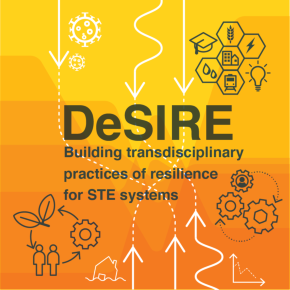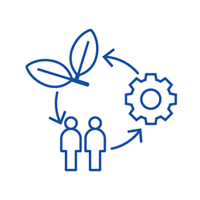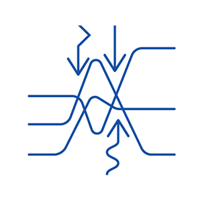‘Designing Systems for Informed Resilience Engineering’ (DeSIRE) is an extensive interdisciplinary research programme that shapes the 4TU Centre for Resilience Engineering (4TU.RE Centre) and builds its capacity. Our understanding of resilience goes beyond robustness of infrastructure; we focus on resilience as the ability of coupled social-technical-environmental (STE) systems to absorb, react, recover, adapt and reorganize with change.
Our mission is to advance and consolidate the understanding of resilience thinking, measuring resilience, and resilience coordination and governance. This mission statement conveys the 4TU.RE community approach to resilience and the premises upon which this approach makes a difference.
About DeSIRE
The DeSIRE programme is an initiative of the four universities of technology in the Netherlands (4TU): Delft University of Technology, Eindhoven University of Technology, University of Twente and Wageningen University and Research. It shapes the 4TU Centre for Resilience Engineering that brings together scientists, engineers and practitioners. Through this Centre and programme we aim to inform and serve policy and practice by creating awareness around resilience and advancing the methods and knowledge base in resilience engineering.
In the DeSIRE programme, we build these capacities by conducting and consolidating research and education across three dimensions:
- Resilience thinking in design and engineering;
- Measuring resilience of STE systems over time and space;
- Ways to inform and improve resilience coordination and governance.
We apply this three-pillar approach across a number of domains – water, energy, urban areas, agriculture and transport – embracing the reality and importance of coupled STE systems. The DeSIRE programme is co-funded by the 4TU strategic research impulse ‘High Tech for a Sustainable Future’ for a period of five years (2018-2022). The programme features 17 Tenure Track positions at the 4TU’s to boost research and capacity, a Resilience Fellowship programme to further international and transdisciplinary cooperation, partnerships and knowledge dissemination and a Resilience Academy to consolidate and develop (open) education resources and programmes on resilience engineering.
Our motivation
 Climate change and extreme events, the degrading environment, aging infrastructure, virus outbreaks, and changing populations, agriculture and food systems. These are just a few of the key challenges we face. Energy, water and food systems adjacent to urban areas, in regions on which cities rely, are increasingly interconnected and vulnerable to shocks and stressors. At the same time, the nature of governance in our interconnected world is increasingly decentralized, fragmented and conflict-driven. Against this background, we urgently need to assess and – where necessary and possible – improve the resilience of our systems. We may need to (re)design and (re)engineer STE systems based on new, resilience-oriented design principles to make them more adaptive to changing trends, and that enable agile reactions to shocks. In short, engineering needs ‘resilience lenses’: the ability of scientists, engineers, stakeholders and policymakers to look at our systems from a viewpoint of how to continue the provision of services in the face of change.
Climate change and extreme events, the degrading environment, aging infrastructure, virus outbreaks, and changing populations, agriculture and food systems. These are just a few of the key challenges we face. Energy, water and food systems adjacent to urban areas, in regions on which cities rely, are increasingly interconnected and vulnerable to shocks and stressors. At the same time, the nature of governance in our interconnected world is increasingly decentralized, fragmented and conflict-driven. Against this background, we urgently need to assess and – where necessary and possible – improve the resilience of our systems. We may need to (re)design and (re)engineer STE systems based on new, resilience-oriented design principles to make them more adaptive to changing trends, and that enable agile reactions to shocks. In short, engineering needs ‘resilience lenses’: the ability of scientists, engineers, stakeholders and policymakers to look at our systems from a viewpoint of how to continue the provision of services in the face of change.
Our ambition and approach
The ambition of DeSIRE and the 4TU.RE community is to create a solid scientific and engineering knowledge base about the resilience of coupled STE systems and to translate this knowledge into educational programs, policies, designs and solutions that benefit society. DeSIRE researchers are committed to linking different domains and disciplines within and beyond academia and building a transdisciplinary community around RE. We embrace that various disciplines hold relevant perspectives on resilience and that resilience can be maintained or improved through a wide variety of methods and approaches. To promote transdisciplinary cooperation, we have established thematic working groups and engage in events such as workshops and conferences, where we discuss interdisciplinary challenges and explore concrete case studies with other researchers as well as with policymakers and practitioners.
The DeSIRE definition of resilience
In the DeSIRE programme we understand resilience as:
The ability of a socio-technical-environmental system to sustain, improve and innovate its key functions – through absorbing, reacting to, recovering from, adapting to or reorganizing – in response to chronic stresses, abrupt shocks, and disruptions.
Final note
The goal of this mission statement is to underpin the formation of the scientific working groups within DeSIRE and, thereby, all scientific production and real-life actions within and outside the consortium. This is not a definitive document but a preliminary statement expressing a common starting point for the DeSIRE community. Refining this common ground is an ongoing task which, essentially, captures the whole purpose of the 4TU.RE centre. By elaborating our approach and goals here, we hope to encourage others to join us in our efforts, through international or national collaborations, and both within and beyond the scientific disciplines we collectively represent.




 A distinctive aspect of the DeSIRE (and 4TU RE Centre) definition of resilience is an explicit focus on the resilience of STE systems. While others primarily study resilience from a community, infrastructure, socio-technical or social-ecological perspective, we associate resilience with coupled STE systems. Our view on resilience is integrated, holistic, complex; it is closely connected to the notion of complex adaptive systems. However, we acknowledge that system boundary judgements are inevitable. Transition, disruptive thought, and dealing with uncertainty are inherent keywords driving the DeSIRE activities.
A distinctive aspect of the DeSIRE (and 4TU RE Centre) definition of resilience is an explicit focus on the resilience of STE systems. While others primarily study resilience from a community, infrastructure, socio-technical or social-ecological perspective, we associate resilience with coupled STE systems. Our view on resilience is integrated, holistic, complex; it is closely connected to the notion of complex adaptive systems. However, we acknowledge that system boundary judgements are inevitable. Transition, disruptive thought, and dealing with uncertainty are inherent keywords driving the DeSIRE activities. In DeSIRE, we associate resilience with a system’s response to acute shocks (fast-moving perturbations) and chronic stresses (slow-moving perturbations). We consider not only externally induced perturbations, such as the impact of climate change or migration, but also disruptive technology or innovations. In DeSIRE, we focus on five overarching themes: Water, Energy, Agriculture, Urban, and Transportation Networks.
In DeSIRE, we associate resilience with a system’s response to acute shocks (fast-moving perturbations) and chronic stresses (slow-moving perturbations). We consider not only externally induced perturbations, such as the impact of climate change or migration, but also disruptive technology or innovations. In DeSIRE, we focus on five overarching themes: Water, Energy, Agriculture, Urban, and Transportation Networks. In DeSIRE, resilience is about maintaining or improving key functions of a system, while acknowledging the trade-offs this may entail. We take the consideration of the functioning of vital and critical infrastructure as being embedded in society and interacting with the environment to be of utmost importance. Our judgements about what to include are value-laden. As we focus on coupled STE systems, the question of resilience “for whom” is as important as “for what”, motivating us to actively embrace stakeholder engagement and participation. The proactive role for researchers, adopting an open communication with stakeholders, bridging academia and practice, and transdisciplinarity are the cornerstones of DeSIRE.
In DeSIRE, resilience is about maintaining or improving key functions of a system, while acknowledging the trade-offs this may entail. We take the consideration of the functioning of vital and critical infrastructure as being embedded in society and interacting with the environment to be of utmost importance. Our judgements about what to include are value-laden. As we focus on coupled STE systems, the question of resilience “for whom” is as important as “for what”, motivating us to actively embrace stakeholder engagement and participation. The proactive role for researchers, adopting an open communication with stakeholders, bridging academia and practice, and transdisciplinarity are the cornerstones of DeSIRE.  DeSIRE tackles resilience through the mechanisms of absorption, reaction, recovery, adaptation and reorganization. These mechanisms are in line with our definition of resilience. While focusing on the systemic dimension of resilience, we argue that a system should be able to absorb some level of perturbation while sustaining key functions, i.e., there is no noticeable effect of the perturbation on the system function. In case of a major disruption, the system can recover itself or reorganize, coming back to its original state or evolving to a more desirable state.
DeSIRE tackles resilience through the mechanisms of absorption, reaction, recovery, adaptation and reorganization. These mechanisms are in line with our definition of resilience. While focusing on the systemic dimension of resilience, we argue that a system should be able to absorb some level of perturbation while sustaining key functions, i.e., there is no noticeable effect of the perturbation on the system function. In case of a major disruption, the system can recover itself or reorganize, coming back to its original state or evolving to a more desirable state.